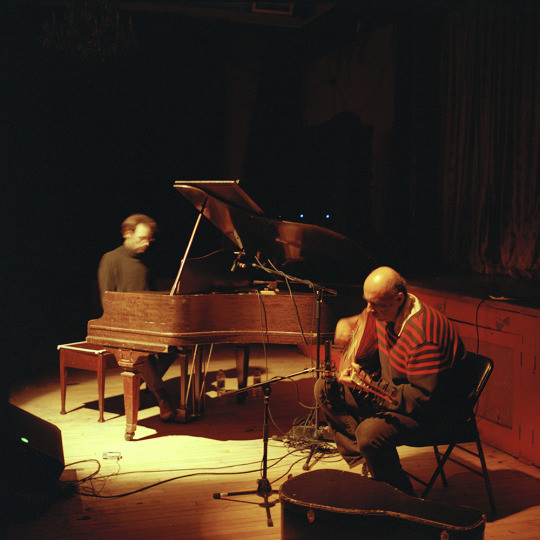Howl! for Artists Everywhere
Local Arts Collective Challenges Notions of Art in the City
Inside Le Cagibi’s ramshackle side room, a lanky man in a black turtleneck sat cross-legged on a small chair on stage. Bent intently over his electric guitar, his angular shoulders swept around the instrument like drooping branches of a willow tree.
Mellifluous plucks and twangs echoed off the worn walls as Montreal experimental artist and co-founder of Howl! Arts Collective Stefan Christoff picked at the strings of his guitar, performing tracks from his new release, c’est pas fini à Montréal, a record focused on reclaiming city space for the independent arts.
The event was part of a fall series that ran until Oct. 30 for Howl!, a grassroots community arts initiative focused on promoting local social justice issues through art and music events.
“The first thing, is [that] I want to make sure that this notion of art as being non-political is challenged,” Christoff said.
Christoff, who is a journalist as well as a musician, co-founded Howl! in the autumn of 2010. The arts collective was started as a community initiative to create a space in the cultural world for grassroots activism, he said.
“[Our] goal, in a way, is to sustain and continue to build a presence within the independent arts [to create] solid links between creative expression and struggles for social justice.”
According to Christoff, the album’s title discusses the city as a place that can provide nurturing space for the arts—and not just arts as mediated by formal structures such as grants or demands of the market. It’s about arts as part of an independent community process. This new release points to the importance of preserving community spaces that encourage the arts to flourish.
“I say ‘c’est pas fini à Montréal’ [because it’s] not finished for the arts, the independent creative process, that’s rooted in a broader understanding of art as related to society,” Christoff said.
“Because of economic circumstance, gentrification [and] rising rents, artists … are often forced to really shape their work in relation to market trends, in relation to a product-oriented vision,” Christoff added. “I think we’re lucky in Montreal to be in the situation where that’s not the case. Montreal is not finished, it’s not totally gentrified, and it’s not totally overrun, not totally hostile to that vision of the arts.”
In Christoff’s case the issue of preserving independent arts spaces arose, in part, out of watching his former neighbourhood slowly become gentrified.
Griffintown is a prime example of un-thoughtful development as simply a process of bulldozing, Christoff said. Gentrification claims a neighbourhood and revamps its history.
Christoff takes issue with not only what is torn down, but the structures that are implanted in their places.
“Condos are inaccessible. They are not development in a true sense. They are the commodification of land and territory, and it’s violence because it means that that neighbourhood is inaccessible to a lot of people. Artists, sure, but many other people, too.”

For him, the strong presence of grassroots activism in the city’s history gives him reason to hope for change.
“I think it’s very important as progressives, as community-oriented artists, to understand that structures of power are not final and processes are evolving.”
He sees more than a lost cause in already gentrified neighbourhoods, and hopes to bring about change with his work.
“Political process, economic process, municipal process, they evolve and change,” he said. “Griffintown has changed very much, but that doesn’t mean that it can’t be something else in the future.”
Howl! is not the first organization with visions of change, hoping to make a difference in the city. Looking to the past, Christoff spoke of the rich timeline of grassroots activism throughout Quebec’s history, from the Quiet Revolution to the more recent student strikes.
“[All of] the space that opened up for rent to be more affordable, for artists to have more space to do their work, [was] a direct result of the political turmoil in Quebec society,” he said.
“The social movements of Quebec made Quebec society more hostile to the neoliberal model,” he said, “So what [Howl! is] trying to do is be one small part of expressing that.”
Howl! will hold another series of events as part of its annual arts festival in early 2016.

_900_507_90.jpg)
_600_832_s.png)

